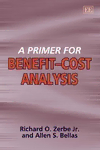
A Primer for Benefit–Cost Analysis PDF
323 Pages·2006·2.811 MB·English
Most books are stored in the elastic cloud where traffic is expensive. For this reason, we have a limit on daily download.
Preview A Primer for Benefit–Cost Analysis
Description:
Benefit-cost analysis (BCA) is the best technique for analyzing proposed or previously enacted projects to determine whether undertaking them is in the public interest, or for choosing between two or more mutually exclusive projects. An introduction to BCA for students as well as practitioners, this accessible volume describes the underlying economic theory and legal and philosophical foundations of BCA.BCA provides an objective framework around which discussion, correction and amendment can take place. Stated simply, it is the calculation of values for all the inputs into and outputs from a project and then the subtraction of the first from the second. The authors' goal here is to take the mystery out of the process. They discuss practical issues of market-based valuation and aggregation, non-market valuation, practical applications of general equilibrium models, issues in discounting, and the impacts of risk and uncertainty in BCA. They also provide a list of resources and case studies looking at ethanol and the use of cellular phones by drivers.Straightforward in style and cutting-edge in coverage, this volume will be highly usable both as a text and a reference. Advanced undergraduates and masters students in public policy, public administration, economics and health care administration programs will find this a valuable resource. It will also be of great use to agencies that perform benefit-cost analyses.About the Author
See more
The list of books you might like
Most books are stored in the elastic cloud where traffic is expensive. For this reason, we have a limit on daily download.
